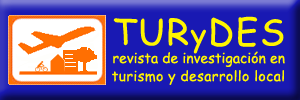
|
Ofertas especiales de Paquetes por Europa con Paris y Londres para los subscriptores de la revista. Visita ya Europa y conoce nuevos lugares y culturas. |
EL TRASPATIO UN RECURSO LOCAL EN LOS SERVICIOS DE “TURISMO RURAL FAMILIAR” ALTERNATIVA DE DESARROLLO SUSTENTABLE MUNICIPAL - CASO: SAN CARLOS, TAMAULIPAS, MĂˆXICO
MarĂa Cecilia Montemayor MarĂn, Pedro Carlos Estrada Bellmann, Jane M. Packard, Eduardo Javier Treviño Garza y Horacio VillaĂ³n Mendoza
Resumen
Al turismo rural
familiar, se le considera como alternativa de bienestar local y regional. Es un
mecanismo de difusiĂ³n de la riqueza natural y cultural del municipio a travĂ©s de
actividades cotidianas y fuente de ingresos a travĂ©s de la prestaciĂ³n de
servicios. Permite a los habitantes de la comunidad mejorar su nivel y calidad
de vida, fortaleciendo a la vez el vĂnculo familiar, arraigo e identidad
regional. En la Cabecera Municipal de San Carlos, Tamaulipas mediante el
Diagnostico Rural RĂ¡pido (DRR) se determinĂ³ su potencial turĂstico. Complemento
de esta metodologĂa es el estudio EtnobotĂ¡nico bĂ¡sico obteniendo el estado
actual de los patios, jardines y huertos de las casas habitaciĂ³n que reflejan un
potencial para la integraciĂ³n de la propuesta de turismo rural familiar. La
importancia del traspatio, refleja el desarrollo o estado sociocultural,
histĂ³rico, ecolĂ³gico y comercial de sus habitantes. Evaluar su potencial es el
propĂ³sito del estudio.
El universo de la investigaciĂ³n comprende las casas habitadas permanentemente
(54%) en el Ă¡rea urbana de la cabecera municipal de San Carlos, Tamaulipas,
considerando variables como nivel socioeconĂ³mico, edad, jefatura del hogar en
cuanto a gĂ©nero, viviendas con servicios pĂºblicos. CaracterĂsticas de las Ă¡reas
verdes de el traspatio son: tamaño, numero de de elementos, componentes,
funciones y uso. El nivel de incidencia, que puede favorecer la integraciĂ³n del
concepto de traspatio a la propuesta de turismo rural familiar, es diverso,
desde los propios habitantes, Universidades, Gobierno y Organizaciones no
Gubernamentales.
Summary
To the family
ranch tourism, it is considered him like alternative of local and regional
well-being. It is a mechanism of diffusion of the natural and cultural wealth of
the municipality through daily activities and source of income through the
benefit of services. It allows the inhabitants of the community simultaneously
to improve his level and quality of life, fortifying the familiar bond, root and
regional identity. In the Distric of San Carlos, Tamaulipas, Mexico, by means of
the diagnose Rural Express (DRR) determined its tourist potential. Complement
of this methodology is basic the EtnobotĂ¡nico study obtaining the present state
of the patios, gardens and orchards of the houses room that reflect a potential
for the integration of the proposal of familiar rural tourism. The importance of
traspatio, reflects the development or sociocultural, historical, ecological and
commercial state of its inhabitants. To evaluate its potential is the intention
of the study. The universe of the investigation includes/understands the houses
inhabited permanently (54%) in the urban area of the municipal head of San
Carlos, Tamaulipas, considering variable like socioeconomic level, age,
headquarters of the home as far as sort, houses with services public.
Characteristics of the green areas of traspatio are: size, I number of elements,
components, functions and use. The incidence level, that can favor the
integration of the concept of traspatio to the proposal of familiar rural
tourism, is diverse, from the own inhabitants, nonGovernmental Universities,
Government and Organizations.
MarĂa Cecilia Montemayor MarĂn: Estudiante de Postgrado de la Unidad AcadĂ©mica Multidisciplinaria AgronomĂa y Ciencias, Universidad AutĂ³noma de Tamaulipas. (UAMAC-UAT).
Pedro Carlos Estrada Bellmann: Profesor Investigador de la Unidad AcadĂ©mica Multidisciplinaria AgronomĂa y Ciencias, Universidad AutĂ³noma de Tamaulipas. (UAMAC-UAT).
Jane M. Packard: Associate Professor, Wildlife & Fisheries Sciences, Texas A&M University.
Eduardo Javier Treviño Garza: Profesor Investigador de la Facultad de Ciencias Forestales, Universidad AutĂ³noma de Nuevo LeĂ³n.
TURyDES es una revista académica iberoamericana, editada y mantenida por el Grupo eumed●net de la Universidad de Málaga.
Para publicar un artículo en esta revista vea "Sobre TURyDES ".
Para cualquier comunicación, envíe un mensaje a turydes@eumed.net

|
Ofertas especiales de Paquetes por Europa con Paris y Londres para los subscriptores de la revista. Visita ya Europa y conoce nuevos lugares y culturas. |